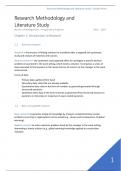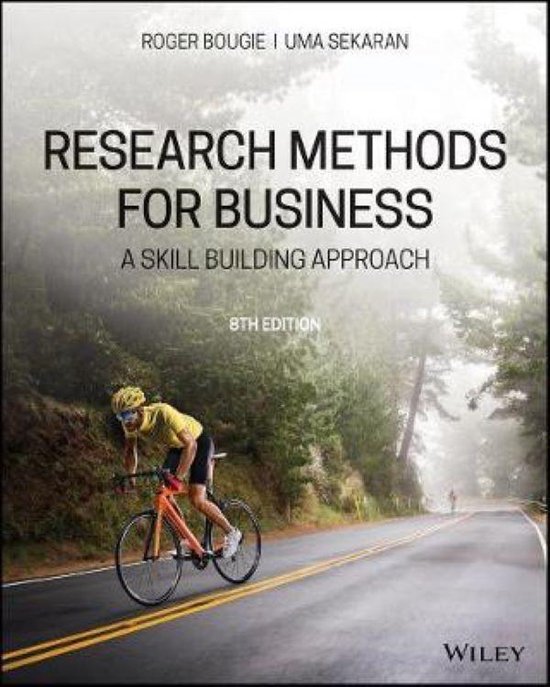Research Methodology and Literature Study | Claudio Pinna
Research Methodology and
Literature Study
Master of Management – Preparatory Program 2022 - 2023
Chapter 1: Introduction to Research
1.1. Business research
Research = the process of finding solutions to a problem after a targeted and systematic
study and analysis of materials and sources.
Business research = the systematic and organized effort to investigate a specific decision
problem encountered in the work setting, which needs a solution. It comprises a series of
steps executed to find answers to the issues that are of concern to the manager in the work
environment.
Forms of data:
- Primary data: gathered first-hand
- Secondary data: data that are already available
- Quantitative data: data in the form of numbers as generally generated through
structured questions
- Qualitative data: data in the form of words as generated from the broad answers to
questions in interviews or responses to open-ended questions
1.2. Basic and applied research
Basic research: to generate a body of knowledge by trying to comprehend how certain
problems occurring in organizations can be solved (e.g., causes and consequences of global
warming).
Applied research: to solve a decision problem faced by the manager in the work setting,
demanding a timely solution (e.g., global warming knowledge applied to construction
industry).
1
, Research Methodology and Literature Study | Claudio Pinna
Relationship between basic and applied: “Though the goal of engaging in basic research is
primarily to equip oneself with additional knowledge of certain phenomena and problems
that occur in several organizations and industries with a view of finding solutions, the
knowledge generated from such research is often applied for solving organizational
problems.”
Basic research is not the sole property of universities, many big companies also do basic
research, either directly themselves or by funding research centres (e.g., Facebook studies
online behaviour and interactions to gain insights in how social and technological forces
interact).
1.3. Quantitative and qualitative methods
Quantitative methods:
2
, Research Methodology and Literature Study | Claudio Pinna
Qualitative methods:
1.4. Why managers need research skills
A manager does not necessarily conduct any research but has to understand, predict and
control events that are dysfunctional within the organization (e.g., a newly developed
product that isn’t taking off).
Minor problems may be fixed by the manager, but major problems require the hiring of
outside researchers/consultants.
Managers need the ability to interpret the results of published research that has addressed
similar issues.
Managers need to interact with hired researchers and consultants effectively.
Managers need to convert research report about their organization handed over by
professionals into actions.
Managers need to understand biases and limitations to research.
3
, Research Methodology and Literature Study | Claudio Pinna
1.5. Internal vs external consultants/researchers
When a manager hires an external consultant, they need to make sure that:
- Roles and expectations are clear from the start, for both parties (e.g., boundaries or
research assignment).
- Values and constraints of organisation are communicated (e.g., GDPR, firing is not an
option, …).
- Employees trust consultant and will cooperate where needed.
An internal researcher comes from within the company, for example the R&D department,
management service department, HR department, …
Important arguments to choose for one or the other relate to:
- Conflicts of interest
- Price (cheaper)
- Organizational biases
- Broad experience
- Acceptance
- Extensive training
- Implementation of conclusions
- Understanding of organizations
- New ways of thinking
Chapter 2: Hallmarks of Good Research and Different Research
Approaches
2.1. From business research to good business research
Research = process of finding solutions to a problem after targeted and systematic study and
analysis of materials and sources.
“Good” research = scientific research (not based solely on hunches, experience and intuition,
but purposive and rigorous):
- Should allow those interested in researching similar issues to come up with
comparable findings when data are analysed.
- Helps researchers state their findings with accuracy and confidence.
4





